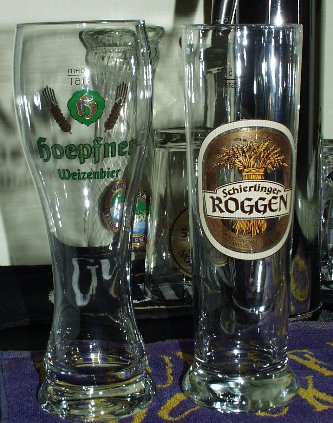ronjer
Well-Known Member
I've seen this term/style pop up before, but I cannot find anything about it. Anyone know??




ROGGENBIER
AKA:
Rye Ale
Pronunciation guide for English-speakers:
Pronounce "Roggen" (German for "rye") like "rogg'n'" a combinination of "rocking" and "rigging," but swallowing the "i" and "g" in "ing" "Gose-uh" as in "rose" plus "uh."
Definition:
Roggenbier is a medieval ale usually made from a grain bill of about half barley malt and equal portions of wheat and rye malts. Today, a Roggenbier may be either an ale or a lager. Modern renditions of the brew have about 5 to 5.5% alcohol by volume. Rye ales are mildly hopped, which allows the grain flavors to be dominant. Filtration appears to be optional in a rye ale and many, such as the Paulaner (depicted right) are "naturtrüb," meaning naturally turbid. A yeast-turbid Roggenbier is more authentic, considering that the style had been around long before beer filtration was invented in 1878.
Being ancient brews, Roggenbiers can have a faint whiff of earthiness in the nose that is reminiscent of rye bread. The up-front sensation is one of mild fruitiness. There is a slight to extreme yeastiness and breadiness in the middle, and an almost smoky, spicy, faintly sour and very dry finishclearly the effects of the rye malt. Effervescence ranges from medium to spritzy like a Hefeweizen. The body is substantial, almost reminiscent of a Bockbier. The brew has a pleasant, rich, off-white head when poured.
For the most part, Roggenbiers are tart, refeshing summer quaffing beers, a nice alternative to a Hefeweizen. They go extremely well with a succulent slice of barbequed roast pork.
krispy d said:from the German beer institute website:

![Craft A Brew - Safale S-04 Dry Yeast - Fermentis - English Ale Dry Yeast - For English and American Ales and Hard Apple Ciders - Ingredients for Home Brewing - Beer Making Supplies - [1 Pack]](https://m.media-amazon.com/images/I/41fVGNh6JfL._SL500_.jpg)













I would like to do the PM version as I am doing only extract at the moment, and I would welcome your input on how to PM. Thanks for the reply, I am looking forward to trying this out. I'll just do your recipe first and then decide if I want to deviate afterward.mjm76 said:Heres what I did......this is a partial mash recipe, so if do all grain, just substitute for the extract. If you have never done PM, reply bakc and I can walk you through that (much simpler than some other explanation you will get).
6.0 lbs wheat LME (60/40)
3.0 lbs Rye malt
1.0 lbs Flaked Rye
0.5 lbs carawheat
0.25 lbs chocalate wheat
0.5 lbs munich malt (could subsitute pils or 2 row, just trying to get enzymes)
1 oz Hallertauer @ 60 min
1/2 Hersbrucker @ 30 min
1/2 Hersbrucker @ 10 min
Wyeast Bavarian Wheat
In retrospect I would probably use Saaz for aroma and flavor to add to the spiciness, I also might add more rye for the same reason. But suit it to your tastes and see what you come up with.
ronjer said:I would like to do the PM version as I am doing only extract at the moment, and I would welcome your input on how to PM. Thanks for the reply, I am looking forward to trying this out. I'll just do your recipe first and then decide if I want to deviate afterward.
Dennys Fine Consumptibles said:I can't find rye malt here so I use rye flakes. Just mash Pils or Stout malt (high diastatic power) or add amaylase enzyme to the mash if doing a high % of unmalted rye.
Rice hulls help. Though I seem to be doing OK with my wheat/rye mashes without them. Maybe I just have the miricle manifold. lol